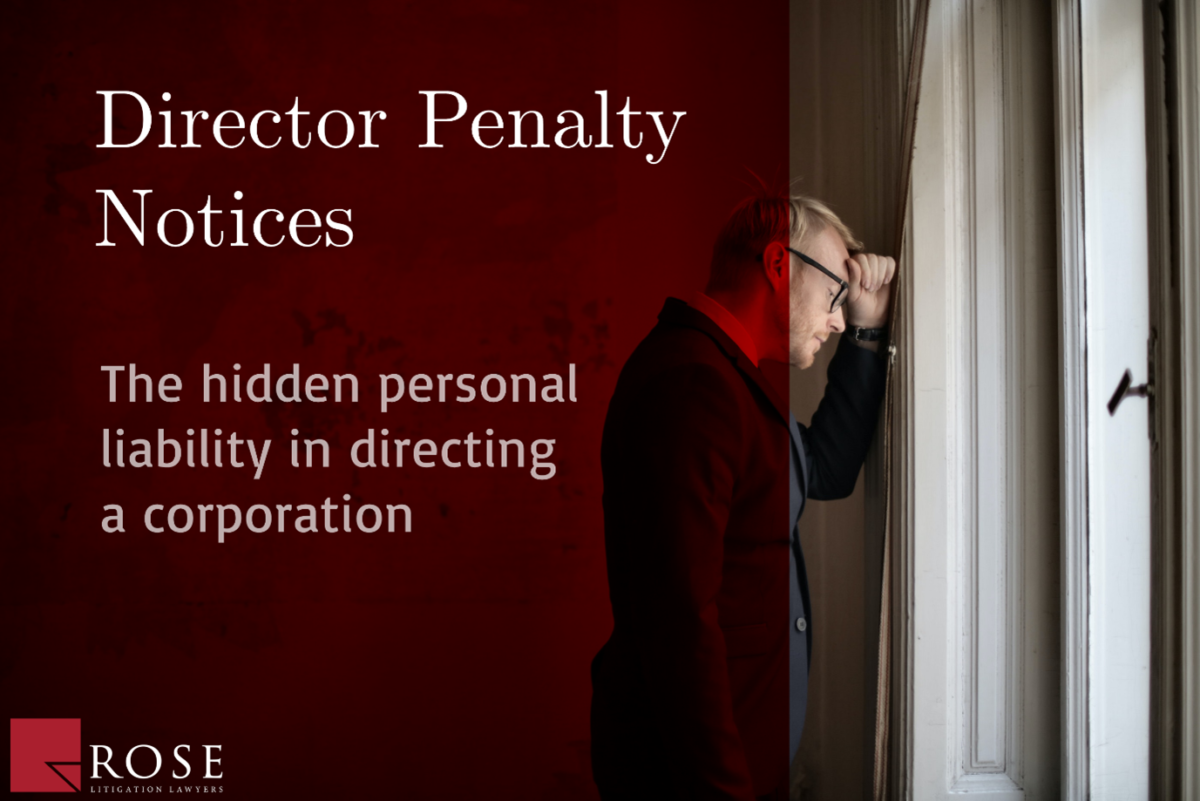Directors of Australian corporations might think that they assume no personal liability for the financial shortcomings of their company. After all, one of the advantages to setting up a corporation is that it becomes an entirely separate legal entity to its shareholders. However, directors should be aware that in certain circumstances the Australian Tax Office (‘ATO’) has the power to attach personal liability on to directors by way of Director Penalty Notices for unpaid corporate taxes. The ATO is dogmatic in issuing and enforcing Director Penalty Notices.
What is a Director Penalty Notice
A Director Penalty Notice (‘DPN’) is a notice that the ATO can issue to directors to recover unpaid amounts of:
- pay as you go withholding (‘PAYGW’);
- goods and services tax (‘GST’); and
- super guarantee charge (‘SGC’).
Pursuant to the Tax Administration Act 1953 (Cth) (‘TAA53’) schedule 1 section 269-25, the Commissioner of Taxation must not commence proceedings to recover unpaid corporate taxes until twenty-one (21) days after the provision of a DPN. The DPN must:
- set out what the Commissioner believes the unpaid amount of the company’s liability under its obligation is;
- state that the director is liable to pay the Commissioner, by way of penalty, the unpaid amount under TAA53 division 269; and
- explain the main circumstances in which the penalty will be remitted.
How do DPNs affect directors
The ATO’s power to hold directors legally responsible for company liabilities means that directors must pay close attention to company finances and particularly to the company’s payment and reporting of tax liabilities. Directors will be responsible for liabilities that arose before their appointment and after their resignation, if the liability first arose during or before their directorship. As observed by French J in Fitzgerald v DCT (1995) 68 ATR 770:
“…it is the responsibility of a new director at or prior to taking up his appointment to make inquiries of the relevant officers of the company as to whether there were any moneys owing by the company to the respondent.”.
Further, by way of example, the Court in Deputy Commissioner of Taxation v Roche [2014] WASC 222 held that a director who was a university student and did not review company affairs “on a day to day basis” was personally liable for unpaid PAYGW amounts despite having a limited involvement in the company’s activities. The Court went on to provide that a director who could be described as a “sleeping director” assumes the danger of director penalties and cannot circumvent liability merely because they failed to be attentive to company details.
It is crucial that all directors are constantly attentive to their company’s PAYGW, GST and SGC liabilities.
Are there any defences to a DPN
The TAA53 schedule 1 section 269-35 provides three (3) defences to the prosecution of a DPN.
All reasonable steps
A director is not liable to a director penalty if he or she took all objectively reasonable steps (Deputy CMR of Taxation v Thomas Wilson [2018] NSWDC 302) to ensure that one of the following happened:
- the director caused the company to comply with its obligation;
- the director caused an administrator of the company to be appointed;
- the director caused a small business restructuring practitioner for the company to be appointed; or
- the director caused the company to begin to be wound up.
A director is also not liable to pay the penalty where there were no reasonable steps that he or she could have taken to ensure that any of the abovementioned things could have happened; however, the Court has been reluctant to afford directors protection under this. Although TAA53 schedule 1 section 296-35(2)(a) merely requires “one of the following” to happen, the Court has construed this defence to be “cumulative”. Per Handley JA in Canta v Deputy Commissioner of Taxation [2005] 63 NSWLR 152:
“(i)f reasonable steps taken in pursuit of one option fail, non-compliance and the obligation of the director or former director will continue. The director or former director will therefore have to take reasonable steps to achieve compliance in another way. If non-compliance continues long enough before a notice is served, each of the four options will eventually have to be addressed…”.
Therefore, even if a director has satisfied one of the elements of the ‘all reasonable steps’ defence, he or she may still be liable to pay the unpaid amount.
Illness
A director is also not liable for a director penalty where he or she was ill (or has some other good reason related to health) and it would have been unreasonable to expect the director to take part in the management of the company at any time when a PAYGW, GST or SGC liable was not met.
Reasonably arguable treating of the Superannuation Guarantee (Administration) Act 1992 (Cth) or the A New Tax System (Goods and Services Tax) Act 1999 (Cth)
A director is also not liable for a director penalty where that penalty resulted from the company treating the Superannuation Guarantee (Administration) Act 1992 (Cth) or the A New Tax System (Goods and Services Tax) Act 1999 (Cth) as applying to a matter or identical matters in a way that was reasonably arguable. The company also needed to take reasonable care in connection with the applying of that Act as to the matters argued.
I have received a DPN, what should I do?
If you receive a DPN you should urgently seek legal advice as there are strict time limitations. Our team at Rose Litigation Lawyers are experienced in defending DPNs and can promptly provide advice in relation to actions brought against directors by the ATO.
If you have a question about a DPN, intend to defend a DPN you have received, or are worried about the potential consequences of non-compliance with company liabilities like PAYGW, GST and SGC, you can contact us for an obligation free consultation.
